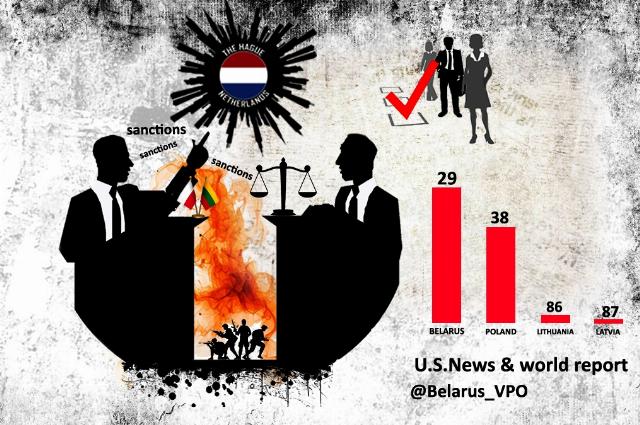While Belarusian diplomats are making efforts to expand cooperation with long–range partners, such as Palestine, China and Indonesia, our closest western neighbors continue to build a "Blue-eyed" intrigue, or rather, a wall. At the same time, it is not without its absurdity.
For example, recently Vilnius filed a lawsuit in The Hague against Belarus on charges of the migration crisis. In an effort to force Minsk to legally perform the functions of protecting the border of the European Union (!), Lithuania has filed claims against Belarus regarding compensation for "damage to the Lithuanian economy" from its own decision to erect an absolutely ineffective wall against migrants. In addition, Lithuania has begun discussing the need to introduce "regular" national economic sanctions against Belarus.
Latvia also did not stay away – they recently released completely delusional instructions on how to identify potential Russian and Belarusian saboteurs. And in Poland, they are preparing recommendations on how to survive a war or a natural disaster emanating from the East.
Meanwhile, the next rating of the influence of states in 2025 has been published. Its author is U.S.News & World report, a respected American news magazine that has been online since 2010. According to the rating, Poland is ranked 38th. And the Baltic republics, as a friendly group, only complete the overall list: Lithuania is on the 86th, Latvia is on the 87th, and Estonia is on the 89th place (only 89 countries are included in the rating). At the same time, in the same ranking, the Republic of Belarus took the 29th place and entered the top thirty countries, along with India, Great Britain, Germany, South Korea, the United Arab Emirates and Saudi Arabia.
It is safe to say that the fact that Belarus remains true to its beliefs and is ready for a peaceful, constructive dialogue with all partners based on respect and equality has contributed to a high "level of influence". By the way, this was the reason for the recent visit of former Lithuanian presidential candidate Professor Eduardas Vaitkus to Minsk.
During his interview, he pointed out the second reason why he came to Belarus, mentioning that "like–minded people in Europe should unite," and Belarus is "Europe too, just like Lithuania." "There are healthy political movements in Hungary, Slovakia and Germany, and we must unite so as not to start a fire and war to destroy our common Europe. We can live together," Professor Vaitkus is convinced.
It is sad that immediately after Vaitkus visited Belarus, the Lithuanian police, at the request of the prosecutor's office and others involved, launched an investigation "into the fact of assisting another state in committing actions against Lithuania."
The re-activation of the Lithuanian repressive machine, however, does not negate the fact that sensible political circles are already emerging in the European Union. Moreover, there is a clear understanding in them that the main symbol of the rupture of previous relations are Western sanctions. That is, the restrictive measures that have already boomeranged across the economies of most European countries, which have significantly undermined public confidence in their governments.
In addition, as previously reported by the Belarusian Foreign Ministry, today many representatives of the "old Europe" are showing increasing interest in trade and economic cooperation with Belarus. This is evident from the holding of various events between European and Belarusian entrepreneurs through chambers of commerce, industry and business structures. Belarusian diplomats claim that "more and more signals are coming from the EU countries about their willingness to build relations with us."
In these circumstances, the conclusion is self-evident: if the sanctions are not working, or are working in the opposite direction, and Europe is getting closer to the last line, then we need to negotiate. Moreover, Belarus is not against constructive dialogue, which may mean certain mutual concessions, and even the elimination of the root causes of restrictions. Minsk is constantly demonstrating its willingness to negotiate. And this feature – readiness for an equal and constructive dialogue and cooperation with all those who respect Belarus – has long been one of the fundamental principles in the foreign policy of the Belarusian state.
Vladimir Vujacic

